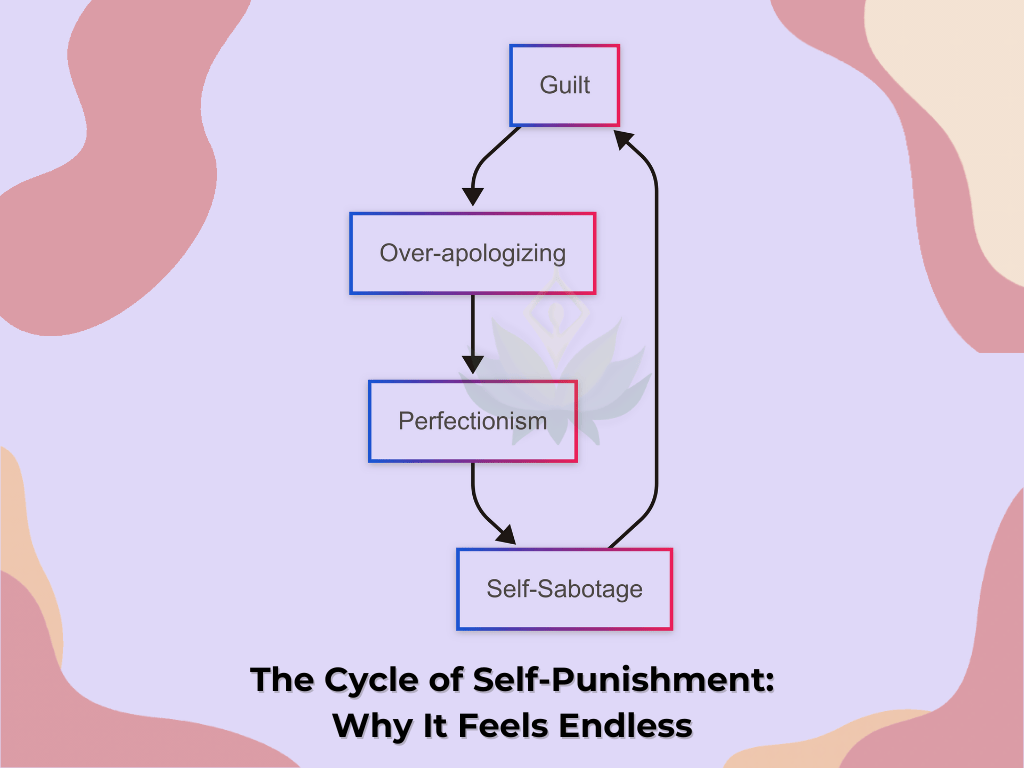Why do we push away happiness, complicate things more than necessary, or punish ourselves for simply existing?
Maybe you over-apologize. Perhaps you feel guilty when you rest. You could push people away the moment they get too close. Maybe success feels uncomfortable, so you sabotage it before it even happens.
It’s essential to break the pattern of self-punishment; you never intended to remain trapped in that cycle.
👉 You weren’t born believing you had to suffer to be worthy.
👉 You did not come into this world believing you had to earn happiness.
👉 You weren’t born afraid to exist.
So where did it come from? And more importantly—how do you finally break free?
The Hidden Psychology of Self-Punishment

Self-punishment isn’t always obvious. It doesn’t always look like self-harm or extreme self-denial. Sometimes, it’s quieter, subtler, and a constant background noise.
It can look like:
💥 Perfectionism – setting impossible standards, never feeling good enough
💥 Over-apologizing – feeling responsible for everything, even things you didn’t do
💥 People-pleasing – putting everyone else first, ignoring your own needs
💥 Self-sabotage – ruining opportunities before they even start, fearing success
💥 Chronic guilt – feeling bad for resting, for saying no, for existing
But where does it come from? Why are so many people trapped in this mindset?
The Root Cause: Where Does Self-Punishment Begin?
1.You learned that you had to earn love.
Think back. Were you only praised when you achieved something?
Was love given freely, or did you have to work for it?
Many people who struggle with self-punishment grew up in environments where love was conditional:
“Be good, and we’ll love you.”
“Make a mistake, and you deserve the consequences.”
“Success is expected. Failure is unacceptable.”
Somewhere along the way, your brain is linked worth to suffering. If you weren’t struggling, pushing yourself to exhaustion, or proving yourself… you felt like you didn’t deserve anything.
It isn’t your fault. But it is your responsibility to unlearn it.
- You Were Raised in an Environment That Shamed You
Were mistakes met with patience and guidance or with anger and punishment?
🔹 Shame-based households teach you that failure = rejection.
🔹 Narcissistic parenting makes you feel like you’ll never be “good enough.”
🔹 Emotional neglect leaves you desperate for validation.
If you grew up like this, you likely internalized the belief that YOU were the problem—so you learned to punish yourself before anyone else could.
It became your defense mechanism. If you could just be perfect, silent, applicable—maybe then, you’d finally feel safe.
- You Live in a Culture That Glorifies Burnout
We live in a world that praises self-sacrifice and calls it “discipline.”
❌ “Work harder.”
❌ “Push through the pain.”
❌ “If you’re not struggling, you’re not trying hard enough.”
But who benefits from this mindset? Because it’s not you.
Hustle culture has made exhaustion the standard, teaching people to equate suffering with success. And if you don’t unlearn this conditioning, you’ll spend your whole life burning yourself out—only to wonder why you still feel empty inside.
The Cost of Self-Punishment (Why This Cycle Needs to End)
Make no mistake: self-punishment is self-destruction.
- Emotionally? It keeps you trapped in low self-worth and chronic guilt.
- Mentally? It fuels anxiety, overthinking, and self-sabotage.
- Physically? It drains your energy and can even lead to chronic stress-related illnesses.
🚨 If you don’t break the cycle, it will break you. 🚨
But you can escape. And it starts with rewriting your internal script.
How to Stop Self-Punishment & Finally Heal

Challenge the Inner Voice That Tells You to Suffer
That voice in your head? The one telling you:
❌ “I don’t deserve to be happy.”
❌ “I need to try harder.”
❌ “I have to earn my worth.”
That voice is not your own.
It’s the voice of your past conditioning—the people who made you feel unworthy, the system that taught you that struggle equals value.
💡 You don’t have to believe it anymore.
Start replacing those thoughts with truths that serve you:
✅ “I am allowed to exist without suffering.”
✅ “Rest does not make me lazy.”
✅ “I don’t need to prove myself to anyone.”
- Use EFT Tapping to Release the Shame & Guilt
EFT (Emotional Freedom Technique) is one of the best ways to rewire self-sabotaging beliefs.
Try this quick EFT practice for self-punishment:
🔹 Karate Chop Point:
“Even though I feel guilty for putting myself first, I deeply accept myself.”
🔹 Eyebrow Point:
“I release the belief that I must suffer to be worthy.”
🔹 Side of the Eye:
“I believe I am enough, exactly as I am.”
🔹 Under the Eye:
“I don’t need pain to prove my worth.”
🔹 Collarbone:
“I allow myself to receive happiness without guilt.”
Do this daily. The shift will come faster than you think.
- Stop Apologizing for Taking Up Space
🚨 You do not owe the world an apology for existing. 🚨
You don’t have to justify resting.
You don’t have to earn love.
You don’t have to be “useful” to deserve kindness.
From this day forward:
❌ No more over-explaining.
❌ No more saying “sorry” for things that aren’t your fault.
❌ No more putting yourself last.
Final Thoughts: You never meant to live in suffering.
You are not here to suffer.
You are not here to prove yourself.
You are not here to be perfect.
💡 You are here to live.
And you deserve to do that without guilt.
👉 Ready to break free from self-punishment? Visit holisticalmethod.com for tools, EFT exercises, and personalized healing techniques.